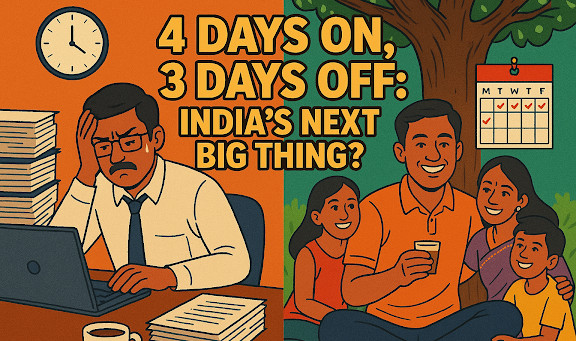The 4-Day Work Week: - Could India Embrace This Game Changer?
The 4-Day Work Week: Could India Embrace This Game Changer?
In recent years, the 4-day work week has shifted from a fringe idea to a widely discussed workplace model, sparking both excitement and skepticism. In a country like India, where long hours are often the norm, could this model offer a refreshing change? As work cultures evolve and technological advances shape our daily routines, the idea of reducing work hours without sacrificing productivity is gaining traction. But is the 4-day work week a genuine game-changer, or just an unfeasible dream? In this blog, we’ll dive into the research, examine how it can transform both employees' lives and organizational structures, and consider perspectives from thought leaders.
What is the 4-Day Work Week?
Simply put, the 4-day work week is a model that allows employees to work four days a week instead of the traditional five. The goal is to maintain the same level of productivity while offering employees more time for personal pursuits, reducing stress, and improving work-life balance. However, there’s an important distinction: the 4-day work week doesn’t necessarily mean reducing the total number of hours worked each week. In some models, employees might work four 10-hour days, while in others, it could involve reducing total hours without extending individual workdays.
Why Should India Consider a 4-Day Work Week?
1. Boosting Productivity
One of the most compelling arguments for the 4-day work week is that it could increase productivity. While it may seem counterintuitive—fewer hours would seem to equal fewer opportunities for output—research actually shows the opposite.
Take the example of Microsoft Japan, which ran a trial in 2019. The company reduced its workweek to four days and saw a remarkable 40% increase in productivity. The shorter workweek allowed employees to focus better during their working hours, minimizing distractions and boosting overall efficiency. Similarly, a 2020 study by Perpetual Guardian in New Zealand found that employees who worked fewer hours were more productive and less stressed.
Key Insight: Reduced workdays encourage focused, high-quality work instead of long hours of diminishing returns. For many employees, working fewer hours results in a stronger commitment to their work, reduced burnout, and a sharper focus during their time in the office.
2. Improved Work-Life Balance
With the advent of remote working, employees have had to juggle professional and personal lives more than ever before. Many struggle to find time for family, self-care, and hobbies. The 4-day work week can help alleviate some of that pressure by giving employees more free time to recharge.
Andrew Barnes, the founder of Perpetual Guardian, says, “The 4-day work week is about valuing what people can do, not the hours they spend doing it.” His experiment with a shortened workweek found that employees were happier, more engaged, and experienced less stress, improving both their work and their well-being.
3. Employee Retention and Attraction
In today’s competitive job market, attracting and retaining top talent is a significant challenge for employers. A more flexible work environment is a major draw for many candidates, particularly those looking to balance demanding careers with their personal lives.
According to Gallup’s 2023 State of the Global Workplace report, flexibility in work hours is one of the top priorities for employees today. Organizations offering flexibility—like a 4-day work week—are more likely to retain workers and reduce turnover rates.
For example, companies such as Unilever and Shake Shack have experimented with flexible work schedules, resulting in happier, more loyal employees. By offering a 4-day work week, employers can build a stronger workforce that values their time, ultimately reducing recruitment and training costs.
4. Attracting New Customers
Employers who adopt the 4-day work week can also create a positive image in the marketplace, making them more attractive to customers who value employee well-being and work-life balance. Companies that prioritize their workforce’s mental and physical health can foster goodwill and potentially increase customer loyalty.
Take Kickstarter, for instance, which transitioned to a 4-day work week in 2020. Yancey Strickler, the company’s co-founder, said, “The 4-day workweek is an opportunity to show the world how business can be done differently. We’re focusing on human well-being, and it’s not just about profits.” This approach not only benefits employees but also sends a positive message to customers about the company’s values.
Challenges Unique to the Indian Workforce
While the benefits are clear, there are also challenges that need to be addressed before the 4-day work week can become the standard in India.
1. Industry-Specific Constraints
Challenge: Certain industries—like healthcare, retail, and customer service—may struggle to implement a 4-day work week without disrupting operations or customer satisfaction. For example, hospitals and restaurants need staff available seven days a week, so creating a balanced schedule for all employees might prove difficult.
Potential Solution: Companies can tailor the 4-day work week model based on industry needs. For example, in healthcare, rotating shifts can ensure coverage while allowing staff to benefit from a shorter work week. Additionally, implementing pilot programs in specific departments can help assess feasibility before a full-scale rollout.
2. Resistance to Change
Challenge: For some businesses, the 4-day work week may be seen as a “pipe dream.” Some employers might argue that it could lead to decreased output or missed opportunities for collaboration. Elon Musk, CEO of Tesla and SpaceX, has been vocal about his opposition to shorter workweeks, saying, “We’ve got a job to do, and the only way we’re going to do it is by working long hours.”
Potential Solution: Implement change management strategies to address resistance. This may involve workshops, training sessions, and open discussions to help employees and management understand the benefits and address concerns. Engaging senior leadership in advocating for the 4-day work week can also significantly influence acceptance.
3. Equity and Fairness
Challenge: In companies that adopt a 4-day work week, it’s essential to ensure that all employees—regardless of role—benefit equally from the change. Some employees, like those in senior roles or those working in leadership positions, may already enjoy flexible schedules, while others may face more constraints.
Potential Solution: Ensure fairness in scheduling by creating policies that guarantee equal participation opportunities. Organizations should recognize that not all roles may be suited for the same 4-day model and offer different versions tailored to various job functions and responsibilities.
Voices from the Industry
Several prominent figures have shared their thoughts on the 4-day work week:
Richard Branson, founder of Virgin Group, says, “If we want to encourage more people to work hard, we need to find ways to give them more time to do what they love. A 4-day work week makes a lot of sense.” His endorsement underscores the growing acceptance of the model in the business world.
Arianna Huffington, founder of The Huffington Post and author of The Sleep Revolution, advocates for reduced working hours, stating, “The way we work is unsustainable. A 4-day work week is not just a perk, it’s a necessity for our mental and physical well-being.”
Conclusion: A Game Changer or Unfeasible Dream?
The 4-day work week is undoubtedly a topic of debate, and the potential for it to revolutionize work culture in India is exciting. For employers, it offers the possibility of increased productivity, employee satisfaction, and talent retention. For employees, it’s a chance to reclaim time, reduce burnout, and enjoy a more balanced life.
While it may not be feasible for every industry or company, the growing evidence of its success in various organizations suggests that the 4-day work week could indeed be more than just a dream. It could be a game changer that benefits both employees and employers, creating a healthier, more sustainable future of work.
The real question now is: How many companies will take the leap to make this dream a reality?
If you get chance how would you introduce 4 days working model in your organization? Please add your thoughts in the comments below.






Comments
Post a Comment